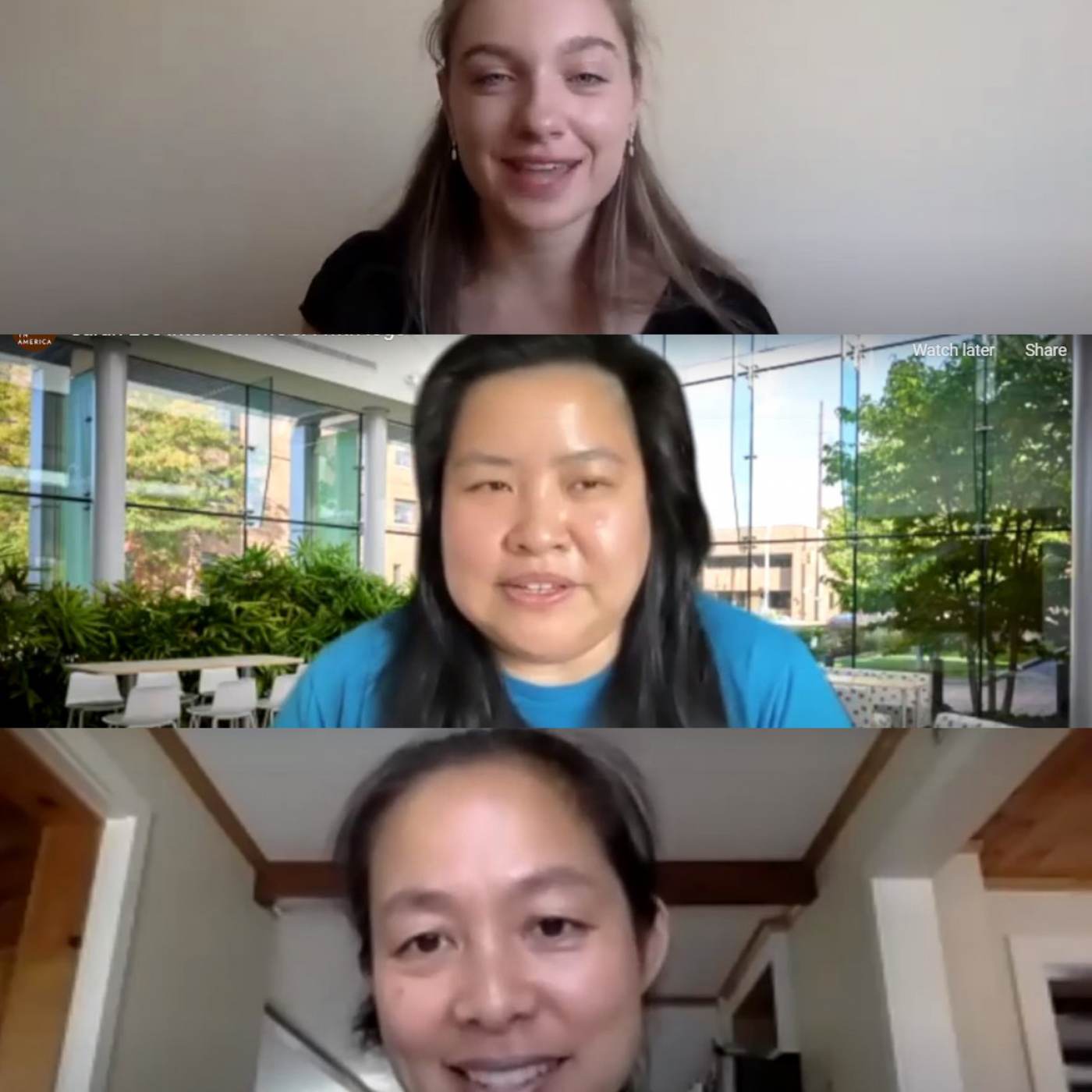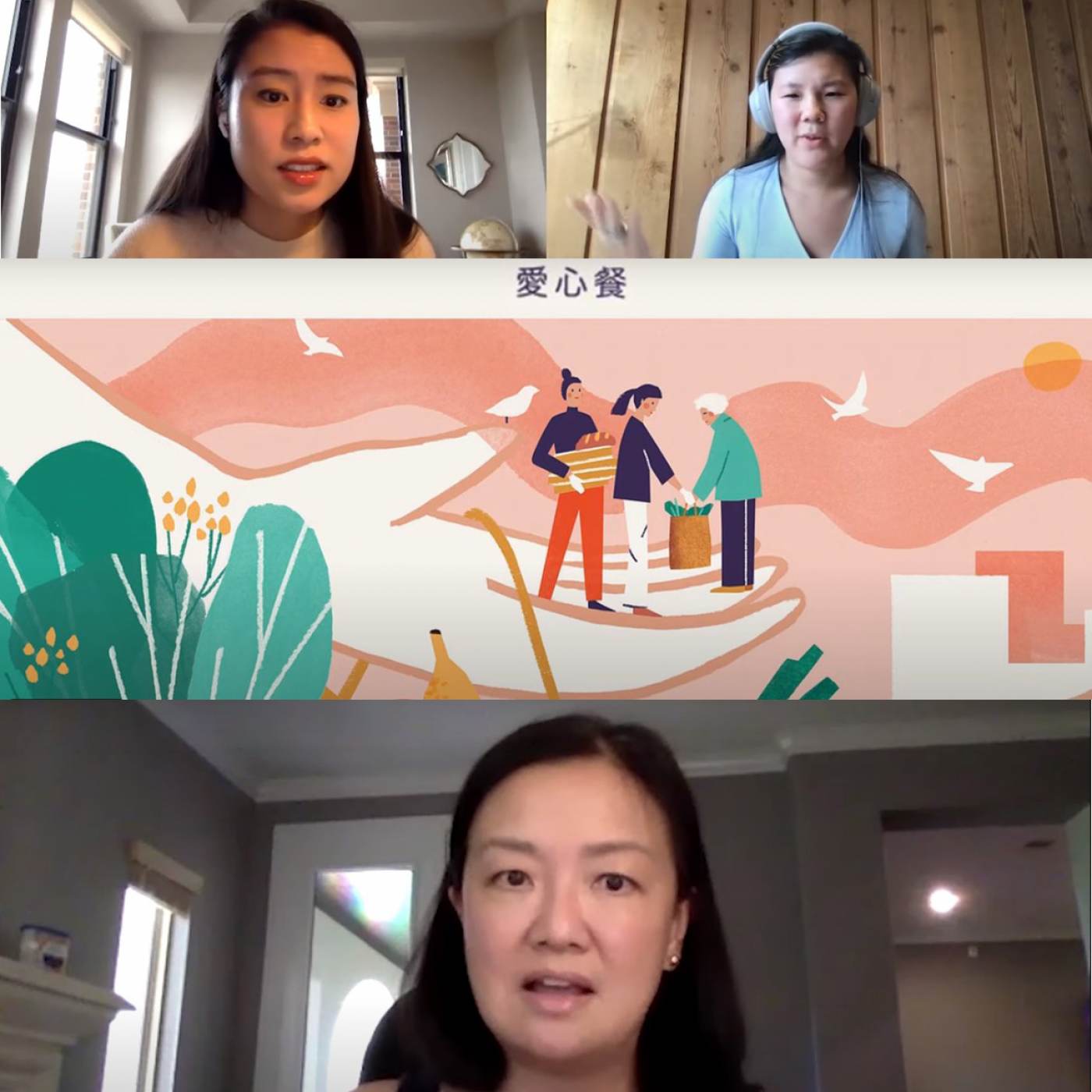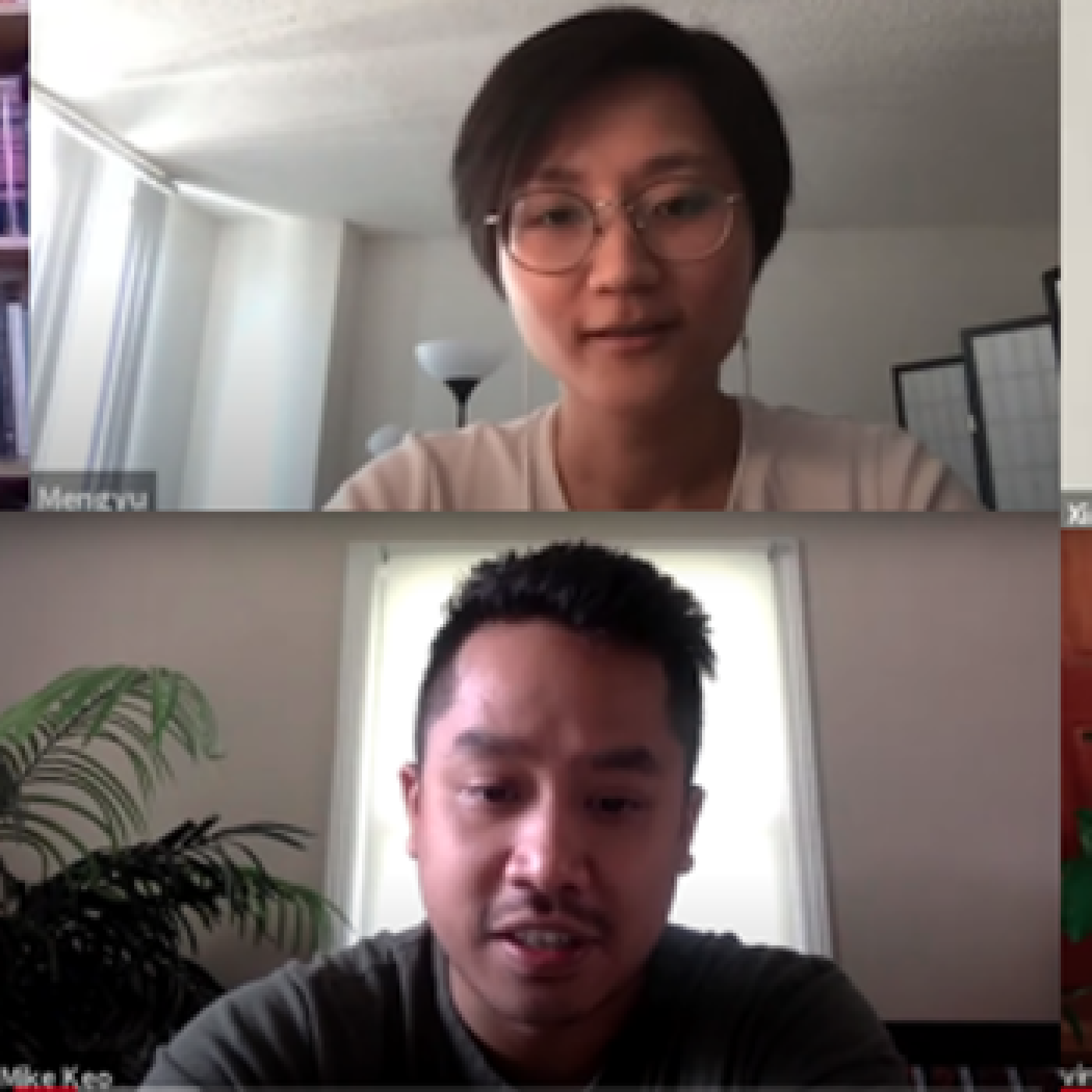Laura Gao is a Chinese American artist and writer who was born in Wuhan, China and immigrated to the U.S. with her family when she was four years old. Gao published a viral comic titled “The Wuhan I Know” on Twitter in March 2020 in the midst of the global COVID-19 pandemic. Working as a product developer for Twitter at the time, she witnessed the sheer volume of racism and abuse from the American public and mainstream media directed towards Asian people on a daily basis. Gao felt a personal responsibility to counter the negative coverage about her hometown and wanted to convey the vibrant culture, history, and people of Wuhan to the American public. Her well-received comic includes drawings of some of Wuhan’s famous landmarks and delicious street food, aiming to dispel prejudice about the city and its inhabitants.
OneWorld COVID-19 Oral Histories-Phase I
LAURA GAO: 'The Wuhan I Know'
RUSSELL JEUNG: Co-Founder of Stop AAPI Hate
An Asian American studies professor at San Francisco State University and a fifth-generation Asian American, Russell Jeung speaks about his integral role in the Stop AAPI Hate hate-crime and incident reporting initiative that started during the onset of the COVID-19 pandemic in the U.S. Professor Jeung and his team contribute to this task force by quantifying and analyzing hate-crime and incident reports to produce metrics such as factors that lead to racism or geographic locations in which Asian Americans are most vulnerable. During this interview, Professor Jeung also divulged some of his passionate views on the Model Minority myth. Specifically, he remarks that not only do Asians have to distance themselves from this narrative, but more importantly they must focus on other critical topics such as gentrification, homelessness, domestic violence and other attacks on the community. During these difficult times, Professor Jeung finds strength in his faith and family as well as within the network of community partners with which Stop AAPI Hate works.
Cecilia Birge: Public School Leader in New Jersey
In this oral history, Cecilia Birge shares her experience of being the Acting Assistant Principal of Princeton High School and navigating the unprecedented challenge of providing quality education during the COVID-19 pandemic. Cecilia also discusses her extensive experience in local politics. Cecilia once served as the mayor of Montgomery township in New Jersey and is the first Chinese American woman ever to be elected mayor of a New Jersey township. After emigrating from Beijing, China many years ago, Cecilia currently sees herself as being a Chinese-American as well as a proud Democrat. Cecilia has kept longstanding connections with Chinese communities, citing that she could not have won her former mayorship with just the support of Chinese residents, but at the same time her victory would have been equally unlikely without Chinese support. Amidst the pandemic, Cecilia once again mobilized her connections with the Princeton Chinese community to fundraise on GoFundMe and donate personal protective equipment (PPE) to local healthcare workers as well as food to students who are on reduced meal plans. She also discusses the challenges of being a school administrator during the pandemic.
Mengyu Dong: A Photo Essay on BLM Goes Viral
As a journalist and photographer, Mengyu Dong started documenting the Black Lives Matter movement shortly after moving to Washington D.C. and witnessing the protests that erupted in response to the death of George Floyd. In publishing her photo essay that featured stories from Chinese and Chinese American activists, she wanted to challenge the misinformation spreading in Chinese social media networks and initiate a conversation with family members on racism and racial justice. Her photos helped convey the emotionality and intersectionality of the movement. Dong also reflected on how her understanding of racism and inequality has evolved in the years since emigrating to the U.S. at the age of 18. She expressed the need for the Asian community to adjust their assumptions of the country as a champion of equality and to understand the underlying problems within society. She described how anti-Asian hostility fueled by the pandemic coupled with the social uprising of the Black Lives Matter movement have produced a sense of urgency and empathy among members of the Asian community who are coming to realize that they have a stake in speaking out and improving their society. Dong stressed that despite antagonism between countries, between abstract ideals, between political struggles, between leaders vying for power, ordinary people still have the appetite for human stories and the desire to connect with each other on a human level.
Xiaowen Liang: Chinese for Black Lives
Xiaowen Liang, a feminist-activist and staff attorney based in New York City, discussed how she collaborated with activists across North America to organize the campaign, “Chinese for Black Lives,” in an effort to elevate the voices within the Chinese community who support the Black Lives Matter movement. She also explained that the campaign seeks to empower and bring together like-minded activists in delivering a unified message for racial justice. She talked about the challenges and successes of canvassing to Chinese restaurant and store vendors, commenting on the effects of worsening Sino-U.S. tensions on international Chinese in America. She also discussed the impact of the potential ban of WeChat on organizing activism efforts within the Chinese community in the U.S. and abroad. She believes the pandemic has revealed various societal shortcomings and issues that will linger even after a vaccine is discovered, and stressed the importance of local organizing and individual activism as a mechanism for solving global problems.
Jennvine Wong: The Attorney Ally
As a staff attorney for the Cop Accountability Project at the Legal Aid Society in New York City, Jennvine Wong has served as a legal observer at many Black Lives Matter protests and handled the emergency legal hotline to locate and provide legal assistance for arrested protesters. Being a legal observer, she has been in physical proximity to police brutality, and expressed shock at the level of violence she witnessed from the police during protests. She discussed how responses from the Asian and Asian American communities to the Black Lives Matter movement have been mixed, reflecting the diversity of experiences, education, and awareness within Asian America. She explained the continuing struggle of finding an unified Asian American political identity, and the ways in which the Model Minority myth has been used as a racial wedge to uphold white supremacy while dividing communities. She stressed the importance of initiating conversations within the Asian community and raising awareness on the causes of structural racism by grounding the discussions in terms of state violence and oppression. Reflecting on the events of 2020, Wong stressed the significance of community building, rapid mobilization, grassroots organizing, and solidarity between individuals and communities in elevating the social movement.
Mike Keo: Founder of #IAMNOTAVIRUS
Mike Keo, a Cambodian American and an award winning wedding photographer, has been spearheading the #IAmNotaVirus campaign. Through personal storytelling, art creation, and mental health resources, Mike and his team share the broad mission of empowering the Asian American community. Over the past months, Mike has been interviewing Asian Americans from diverse backgrounds, including some who identify with multiple races, with the goal of understanding their stories and afterwards taking a headshot of them. Mike hopes that these experiences prove to be empowering and a form of validation for his interviewees.
Chen Weng: The Digital Comic Artist
Originally from Wuhan, China, Chen Weng is a Chinese American artist and graphic designer based in Seattle, Washington who created an online comic series called Messycow Comics. Weng published several short comics about the outbreak of COVID-19 during the beginning of the global pandemic, attempting to provide a positive and comedic outlet for her audience during a time of increasing fear and anxiety. During this oral history, she describes her creative process and audience, noting how she uses comedy to better communicate and connect with both her American and Chinese audiences. Weng goes on to explain that her content for each audience varies based on the different cultural context and background that exists for Chinese and American viewers respectively.
Jing Cai: Fundraising and Donating PPE
As a board member of the American Chinese Culture and Education Foundation (ACCEF) in San Diego, Jing Cai has helped fundraise and donate Personal Protective Equipment (PPE) for healthcare and community organizations across the U.S. during the COVID-19 pandemic. Amid the outbreak of COVID-19 in China, ACCEF rallied its members through a WeChat group to fundraise and purchase PPE for hospitals facing shortages in Hubei province in China. As the situation worsened in the U.S. in March, ACCEF members shifted their focus and mobilized their members to secure funds and PPE for healthcare providers and community organizations both locally in California and nationally in states such as Illinois, New York, Massachusetts, Connecticut, and Louisiana. ACCEF did not have prior experience sourcing medical equipment, and they relied on personal connections through their donor network to secure equipment for donations. Cai discussed the ways in which organizing and fundraising placed her network of Chinese and Chinese Americans within a broader community, opening a window for ACCEF members to see the greater needs of their community and for others to recognize the Chinese community in San Diego. She described the silver lining of the pandemic in bridging communities, revealing human generosity and kindness, and she emphasized the important role of dialogue in helping to resolve bias and discrimination.
Bianca Mabute-Louie: The Educator
A sociologist with a background in teaching and youth organizing, Bianca Mabute-Louie has spent her career engaging in important conversations about race with her students. In the past, Bianca has taught courses on Asian American and women of color at the college and high-school levels. During the COVID-19 pandemic, Bianca continues her social advocacy on social media, such as posting inspirational zines on Instagram to express messages of Black and Asian solidarity. While Bianca humbly remarks that she is simply trying to continue these conversations that she would otherwise have had in person with students, she also recognizes the historical precedents that have long pitted communities of colors against each other, especially targeting Asian Americans who came after 1965, who would have been less informed about the Civil Rights movement. Bianca also recognizes her privilege as an upwardly mobile Asian American, citing the warm welcome she, as a prospective renter, once received from her landlord, while other minority groups are supposedly less welcomed. During the pandemic, Bianca is trying to limit her screen by blocking off hourly chunks in her scheduling.
Robert Lee: Entrepreneur Donates PPE
Robert Lee is the CEO of Pearlstone Partners, a real estate development firm based in Austin, Texas, as well as the former Chairman of the Greater Austin Asian Chamber of Commerce. Through his leadership of the Chamber of Commerce, Lee not only fostered a vibrant business community for the burgeoning population of Asian Americans, but also emphasized the importance of broad Asian representation to strengthen intersectional community involvement. On a personal level, Lee believes in the importance of staying connected with one’s culture and encourages his daughter, a second-generation Asian American majoring in Asian Studies, to study the Chinese language. During this oral history interview, Lee discusses the ways in which the Black Lives Matter movement is similar and different from the Asian American pursuit of racial equality. Noting the negative impact of the Model Minority myth and the relative invisibility of working-class Asian Americans, he argues that the Asian American community and public at large must recognize the internal diversity within the Asian diaspora. Lee goes on to speak about his involvement in the Asian Chamber of Commerce COVID-19 Relief Fund. The campaign involved 26 community organizations that crowdsourced donations through the platform GoFundMe, and used the funds to purchase personal protective equipment (PPE) from Chinese distributors. Lee goes on to discuss the unique challenges of locating and importing these medical equipment donations. Overall, Lee is proud of his city and local community for their efforts to combat racism and hostility during the pandemic.
Cynthia Choi: A Lifetime of Nonprofit Leadership
As the Co-Director of Chinese for Affirmative Action, Cynthia Choi and her organization have played an integral role in running the Stop AAPI Hate task force during the COVID-19 pandemic. Throughout her career, Choi has been working extensively in the non-profit sector focusing on issues ranging from immigrant rights to gender-based violence and reproductive justice. According to Choi, her current organization CAA advocates for systemic change in the fields of educational equality, immigrant rights, and language access. The rise in anti-Asian discrimination and hate crimes have been a disturbing trend for Choi during the pandemic. Despite the work of Stop AAPI Hate, Choi does not believe that hate towards Asian Americans will dissipate any time soon after the pandemic.
Ivan Small: Racism in Connecticut's Restaurants
Dr. Ivan Small is a professor of sociocultural anthropology at Central Connecticut State University. Professor Small is a bi-racial Vietnamese American and first became interested in his Asian heritage after visiting his relatives in Vietnam during his college years. His research weaves together cultural anthropology with Asian studies, economic anthropology and research about migration and transnationalism. During the COVID-19 pandemic, Professor Small published an article in the Connecticut Mirror that examined the struggles and discrimation Asian restaurants were suffering from in Connecticut. This article described the continued existence of implicit racial biases against Asian Americans, juxtaposing a snapshot of a bustling Italian restaurant beside an empty Chinese restaurant. Professor Small notes how the restaurant industry is a pillar of Asian American entrepreneurship and an important means for socioeconomic mobility among Asian immigrant families. He goes on to consider the harmful impact of President Donald Trump’s racially charged rhetoric about COVID-19. When asked about the controversial opinion piece, We Asian Americans Are Not the Virus, written by then presidential candidate Andrew Yang, Professor Small critiques the implications of Asian assimilation and the failures of American multiculturalism.
Marina Bhargava: Asian Eats Gives Campaign
The Austin Asian Chamber of Commerce is an organization that educates and supports Asian American businesses in part of central Austin. In this interview, Marina Bhargava, the CEO of the organization, shares her personal outlook about the Asian business and entrepreneurial scenes in Austin before and during the pandemic. According to Marina, Austin is a bustling entrepreneurial hub that has drawn many large corporations, which also has attracted a growing population of Asian Americans that doubles every 20 years. Unfortunately, many small-sized restaurants and mom-and-pop stores were unable to weather the uncertainty, as well as discrimination, wrought upon them during these tumultuous times. Marina talks about the success of the Chamber’s Asian Eats Gives campaign, which ran from April 2020 to July 2020 and provided funding to 15 restaurants belonging to the Chamber that in turn donate meals to the local community. The restaurants have the freedom to choose to whom they wish to donate the meals, the only requirement being they must take pictures to document their efforts.
Steffi Huynh: Micro-aggressions and Racism
Amid the protests that erupted after the death of George Floyd, recent masters graduate Steffi Huynh wrote an opinion piece for the magazine Diverse: Issues in Higher Education calling Asians and Asian Americans to action in solidarity of the Black Lives Matter movement. During this oral history interview, she discusses how she channeled her energy and emotion into writing the Op-Ed in order to convince others about the importance of the racial justice movement. In her own life, Huynh reflects about how the Black Lives Matter movement opened more conversations with her Vietnamese immigrant parents about the issues of racism and racial justice. She goes on to explain how the convergent events of the COVID-19 pandemic, rise in anti-Asian racism, and Black Lives Matter movement have crystallized her identities as a first-generation college student and second generation Vietnamese American. Huynh shares stories of her and her friends’ experiences with microaggressions since the outbreak of COVID-19 in the United States.
Ellen Wu: What 2020 Means for AAPI History
In this oral history, Ellen Wu, a professor of history and director of the Asian American Studies Department at Indiana University in Bloomington, reflects on the events of 2020 including the rise in anti-Asian hostility and the Black Lives Matter movement. She expressed how the year represents an exciting moment in Asian American history, as both the pandemic and social upheaval have pushed the Asian and Asian American community to initiate discourse on racism and involve themselves in the movement for racial justice. She is constantly inspired by the organizing, activism, and awareness of young activists and people of color. At the same time, she recognized that many within the Asian community, herself included, are anxious and concerned about their own safety amid the growth of anti-Asian discrimination. She described a crossing of a threshold for the Asian and Asian American community as they can no longer deny the existence of racism in the country. She also discussed how history and ethnic studies can open up a way to discover conceptual tools to understand how the world functions and to design a world that is just for everyone.


